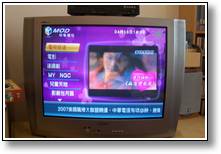 As you know, InvestorBlogger lives in Taiwan. This can be both an exciting and a frustrating experience, often at the same time. A good example of this is MOD TV, which is the topic of this post. MOD is in fact a form of IPTV , which routes a compressed TV signal across the Internet to settop boxes that decode and display the signal as a form of interactive TV.
As you know, InvestorBlogger lives in Taiwan. This can be both an exciting and a frustrating experience, often at the same time. A good example of this is MOD TV, which is the topic of this post. MOD is in fact a form of IPTV , which routes a compressed TV signal across the Internet to settop boxes that decode and display the signal as a form of interactive TV.
So this article introduces TV over IP. It still fairly new in Europe and the US, but it’s been available in Japan for quite some time (years!) and in Taiwan for more than 2 years. In fact, one of my customers was in fact a senior designer for Setabox who are a major manufacturer of TV set top boxes (see graphic). But now it is being adopted in many countries, especially those that already have sufficient broadband capabilities and a ready market.
Getting Connected

In the middle of last year, our building was offered FTTB (Fiber to the building) and suddenly we were able to upgrade our Internet speeds by leaps and bounds. In addition, there was a new feature called MOD. We had long since given up on cable TV, so we opted to try this as an alternative to getting a satellite dish.
In this article, I’ll be introducing the system we have, outlining the benefits of how it is implemented in Taiwan, as well as the pitfalls. Naturally, I’ll be looking at the content as much as the system.
When you turn on the system, you have to remember there are now three boxes that need to be working: your router, your settop box, and your TV! In addition, there are two remotes. Both of these make things a little more complex than they need otherwise be. Setup is straightforward for people with computing skills and who can connect up a pc without much difficulty. But for people challenged by a DVD player, the solution is somewhat trickier.
The Basics
Once on, though, there are two halves, albeit integrated, the first is TV of which we have a selection of 31 or so base channels; and Interactive TV, which includes subscriptions, MOD, VOD, music, banking and games, etc.. To toggle between them is relatively easy, you just hit the toggle switch on the remote.
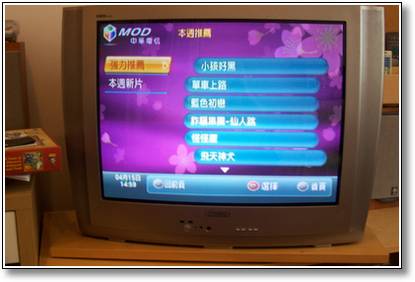
As you will see from the first image, the separate ‘channels’ are listed in sidebar down the lefthand side of the page with movies at the top, dramas, National Geographic, etc. The process for selecting each VOD is pretty similar. In the graphic on the right, you will see the Movies area with the listings on the right. When you click on a movie, you’ll be taken to a page that displays the basic information, along with pricing.
Occasionally, you will have to enter a code for an 18+ movie. You will get a choice of watching a preview or ordering the movie. Once movies are ordered, you have to watch them within 72 hours; but you can pause and return later to watch the rest.
There are other areas that offer similar functionality as Movies with specialized programming, such as the ever popular Hong Kong or Korean dramas (typically 40 or 50 episodes that can be watched over 7 days – my wife loves those!), health, sports – baseball, music, etc..
There are of course password, settings and account information all in their own areas within the menus. Overall, it is a comprehensive system that offers flexibility, variety, some user control, and affordability.
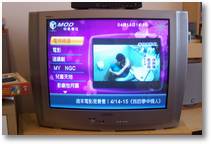 However, as fairly experienced users of the system, and not particularly unsavvy, either. We offer a number of important criticisms of the service as offered by Hinet, many of which make the service of limited value. Perhaps this is why the service is bundled as part of an ADSL package these days, CHT knows it cannot sell this is an acceptable alternative.
However, as fairly experienced users of the system, and not particularly unsavvy, either. We offer a number of important criticisms of the service as offered by Hinet, many of which make the service of limited value. Perhaps this is why the service is bundled as part of an ADSL package these days, CHT knows it cannot sell this is an acceptable alternative.
It’s pluses are quite important. But the downsides severely limit the pluses, so much so that the value of the entire service is brought into question.
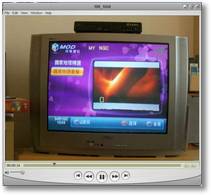 Unusual Variety
Unusual Variety
However, my wife enjoyes the variety and range of movies that MOD currently offers. She has subscribed to a channel within the service that offers a kind of ‘All You Can Watch’ deal and she gets to see quite unusual movies, movies that would not otherwise make it on TV here, or even the video store: European (particularly French and German), Middle Eastern, Korean and Japanese movies, as well as low budget Taiwanese movies. Some of them are pretty good, too. I found several channels that I liked to watch a lot: Australia Network (now cancelled), CNBC (also cancelled), and Soundtrack Channel among them. We both enjoy the ability to watch movies at convenient times, and not having to go to the video store on a rainy night!
The downsides we discovered are quite considerable, though, and we have on several occasions thought about canceling the service altogether. But we’re too busy to complain that much.
Stability
The set-top box is manufactured in Taiwan, with technology from Microsoft. We’re quite willing to give new technology a go, but we have noticed that the software isn’t all that stable, as it occasionally just freezes or has to be manually rebooted. This is very frustrating at times, and doesn’t create much confidence in us! Oddly, though, the network is pretty stable and seldom causes problems: we have sufficient bandwidth for highspeed browsing AND TV services. I daresay we could do even more with FTTB.
System Limitations
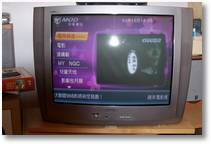 The service has a number of limitations that are particularly disappointing to users: sub-channels are often used to broadcast alternate soundtracks (usually in the original language), but in MOD they are just simply not rebroadcast. Many programs therefore only have the primary dubbing, esp. foreign language movies that have been dubbed into Taiwanese or Mandarin; sound quality of foreign language movies is often very poor due to the high degree of compression used, often the volume has to be increased to make sense of the sound details; subtitles, as used in DVDs, are all missing, so we are unable to watch a French movie with English subtitles, we’re stuck with Chinese subtitles; picture quality often is lower quality, this is not HD tv, so I doubt it would play well on large screen TVs at all, at best you would get very grainy pictures.
The service has a number of limitations that are particularly disappointing to users: sub-channels are often used to broadcast alternate soundtracks (usually in the original language), but in MOD they are just simply not rebroadcast. Many programs therefore only have the primary dubbing, esp. foreign language movies that have been dubbed into Taiwanese or Mandarin; sound quality of foreign language movies is often very poor due to the high degree of compression used, often the volume has to be increased to make sense of the sound details; subtitles, as used in DVDs, are all missing, so we are unable to watch a French movie with English subtitles, we’re stuck with Chinese subtitles; picture quality often is lower quality, this is not HD tv, so I doubt it would play well on large screen TVs at all, at best you would get very grainy pictures.
Programming Quality
There isn’t a great range of TV on the service, so it is not an effective replacement for Cable TV. There are about 14 digital channels anyway in Taiwan, and the service carries most of those terrestrial digital channels. Other than that, most of the other channels are just low quality equivalents of popular TV channels here, either rehashing mainstream news channels, or replaying videos from years ago. Moreover, since we got the service last year, the channels have changed several times with the expiration of channel broadcasting contracts. One channel was cut for a while and two more quality channels have permanently disappeared. The remainder is largely just junk: channels created to fill a space in the programming schedule; channels that don’t cost that much to run because they don’t ‘generate’ revenue for the service.
Video-on-Demand Quality
This service shows regularly some good quality movies that have finished their DVD run, but by then who hasn’t seen most of these new movies! Most of the rest of the movies are European movies, classic movies (often out of copyright in Taiwan), and other very low budget made for TV movies, with bad scripts, bad actors, and so on (get the picture!). You can find good movies here, but you have to wade through a lot of junk to find them.
Additional Services
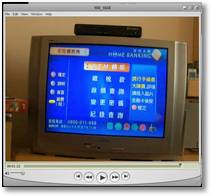 There are additional services provided in the MOD service, including KTV, banking, adult movies (sure to be a moneyspinner), video calls, etc. Unfortunately, most of these are hampered by similar problems: serious limitations, lack of quality control, desire to save money, and poor product substitution. In fact, go to MOD’s webpage and checkout the programming to see for yourself. Unlike digital broadcasting in the UK, there are no radio stations on MOD, no regional TV channels, no rebroadcasts of popular shows, very little music (other than KTV channels), no major sports channels (other than baseball), … CHT have not been able to make much headway with content deals with anything other than the odd distributor. Worse, due to local laws the MOD cannot rebroadcast TV channels, other than the digital TV channels which are terrestrial. Local private channels like ETTV or TVBS or any of the other major channels are unable at this time to do deals with CHT. Naturally, this does not make the situation any better.
There are additional services provided in the MOD service, including KTV, banking, adult movies (sure to be a moneyspinner), video calls, etc. Unfortunately, most of these are hampered by similar problems: serious limitations, lack of quality control, desire to save money, and poor product substitution. In fact, go to MOD’s webpage and checkout the programming to see for yourself. Unlike digital broadcasting in the UK, there are no radio stations on MOD, no regional TV channels, no rebroadcasts of popular shows, very little music (other than KTV channels), no major sports channels (other than baseball), … CHT have not been able to make much headway with content deals with anything other than the odd distributor. Worse, due to local laws the MOD cannot rebroadcast TV channels, other than the digital TV channels which are terrestrial. Local private channels like ETTV or TVBS or any of the other major channels are unable at this time to do deals with CHT. Naturally, this does not make the situation any better.
Conclusion
My assessment of this service is quite simple. As it stands, CHT is asking customers to pay around NT$150 a month for a service to your house that includes sub-standard TV channels, low quality broadcasts (both content and technology-wise), and poor services. In many cases, even if you buy the so-called higher quality programs – you can’t subscribe to any more TV channels – you are still stuck with second-rate movies, second-rate TV shows and seriously limited choices.
CHT should, in all seriousness, be paying people to take the basic service because, as it stands, it wouldn’t be viable except as a subsidized service. If the quality of programming were there, it wouldn’t have to cheapskate itself as it currently is. Because I love my highspeed ADSL, I probably will keep IPTV for the meantime: my wife enjoys the occasional drama series and movie, I still can watch Bloomberg (I guess).
As an emerging technology, though, IPTV offers considerable potential for new TV channels to bypass the traditional distribution markets and reach out directly to consumers and viewers. Joost is trying this, as are a number of other independent broadcasters. Naturally, the big broadcasters will want to control as much of this as possible, but if the new broadcasters create new content, there won’t be as much control as on the Napsters of the music world! What companies will you invest in to take advantage of this new technology? Do you see it as having a bright future or not? Let’s hear it!